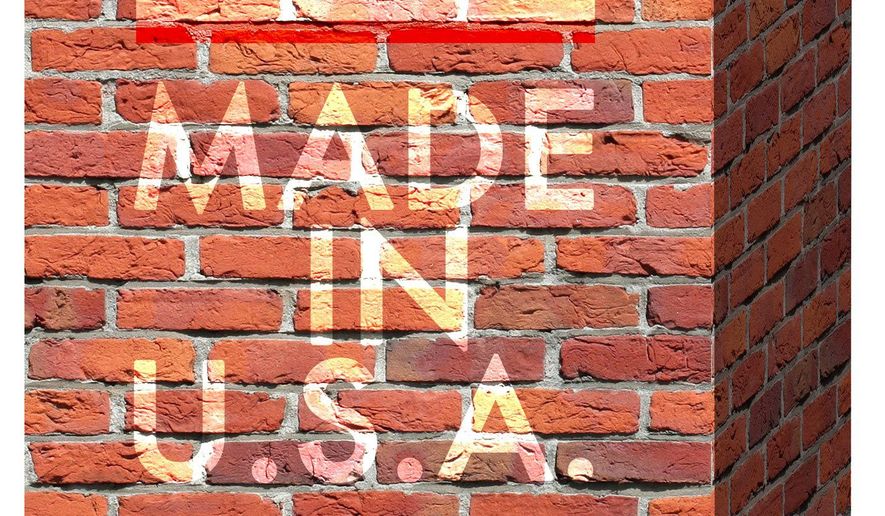Where Donald Trump is Wrong on Trade
By Logan Albright
WashingtonTimes.com

Pat Buchanan recently penned a passionate defense of Donald Trump’s trade policies, defending the argument that free trade hurts Americans and that protectionism is required to keep a nation strong.
Despite enjoying unanimous support from every credible economist since the 18th century, free trade is still the issue that most confuses politicians, voters and commentators alike.
The basic claim is this: that by importing goods and services from other countries, Americans lose jobs, lose revenue and are generally made weaker compared to net exporters like China. This observation is understandable, and it’s a result of what French economist Frederic Bastiat called “what is seen, and what is unseen.” We all see news footage of closed factories in decaying industrial towns, and wish we could do something to help the people who have lost their jobs. What we don’t see are the benefits to American consumers of being able to purchase better quality goods at lower costs or the new jobs created in other sectors because of increased trade. We don’t see the benefits of diverting labor from inefficient uses to more efficient ones. These benefits are very real, but they are not as visible as the job losses that come from a changing industry.
Mr. Buchanan laments that the Chinese exported $482 billion worth of goods to Americans, apparently forgetting that Americans got the enjoyment of $482 billion worth of goods, something that would not have been possible if the government attempted to block trade from China.
The protectionist myth is easily debunked by reducing the analysis from countries, which are complex and hard to understand, to individuals. For example, I run a huge trade deficit with my local grocery store. I buy a lot of food from the grocers, and they buy almost nothing from me. But no one would say that the grocers are growing rich at my expense. I benefit at least as much as they do from the trade, or else I would not engage in it. Does anyone imagine that the government should force me to grow my own food, or can make me better off by imposing an additional tax on groceries? This is effectively what protectionists want to do.
If the individual example seems too abstract, let’s move up to the state level. Mr. Buchananasks “what great nation did free trade ever build?” How about the United States of America? Under the Articles of Confederation, before the ratification of the Constitution, the states commonly erected trade barriers between one another, to the point that the situation was unsustainable. The Commerce Clause in the Constitution, now much abused, was designed to eliminate these barriers, keep trade regular and create a larger market. The Founders learned through experience that protectionism didn’t work, so they sought to eliminate it among the states.
That this should be good for prosperity, not bad, should be obvious. Different states are better at producing different goods and the ensuing specialization and trade enriches the nation as a whole. This was obvious to Adam Smith, to the Founders and should be obvious to today’s policy makers. The fact that California and Florida grow the best oranges may be lamentable to the lonely orange farmer in Kansas, but no one would suggest protecting his job by denying Kansans access to the best oranges in the country. Likewise, banning the importation of maple syrup from Vermont may be good for New Hampshire producers, but it is not for hungry pancake eaters everywhere else.
Forcing consumers to pay more for what they want and need doesn’t create wealth, nor does subsidizing inefficiency. Pat Buchanan is right when he says that “free trade is not a zero sum game,” but misses the implication of his own statement. It is true that some people do lose their jobs due to trade, just as others lose theirs when new technology or advances in knowledge result in more efficient ways to do what they had been doing. None of this means that we should try to stop trade, hold back technology, or outlaw innovation, all which have greatly increased the standard of living in America and the world.
Protectionism, like all government interventions in markets, ends up to protecting the few at the expense of the many. In calling for more tariffs and quotas, Donald Trump reminds one of the apocryphal official touting a jobs program that used shovels instead of modern equipment to dig a canal. Anyone really interested in creating jobs would see in a minute that instead of subsidizing and protecting the inefficient, the fellow should be urging those who only know how to use shovels to learn how to operate the equipment that will allow them to build a better canal more quickly and at a lower price.
Protectionism may shield a few jobs from competition, but it can never create wealth.
• Logan Albright
is senior research analyst at Freedom Works.

